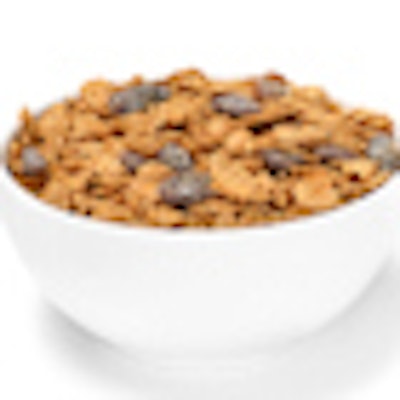
Raisins may be sticky and sweet, but they're not as bad for teeth as traditionally believed, according to a study in Pediatric Dentistry (November/December 2009, Vol. 31, pp. 498-503).
Researchers at the University of Illinois at Chicago (UIC) report that eating bran flakes with raisins containing no added sugar does not promote more acid in dental plaque than eating bran flakes alone.
The research was supported by the California Raisin Marketing Board.
Although raisins can cause caries if consumed in large quantities, they are still quite misunderstood, said Christine D. Wu, M.S., Ph.D., professor and director of cariology research at UIC and lead investigator of the study, to DrBicuspid.com.
Traditionally, it has been thought that because raisins are sticky and sweet, they are difficult to clear off tooth surfaces, Dr. Wu said. But studies have shown that they actually clean very quickly from the tooth surface, much like chocolate and apples, she added.
“Raisin bran cereal may not be as damaging to teeth if proper oral hygiene, such as brushing and flossing, is exercised.”
— Christine D. Wu, M.S., Ph.D.,
professor and director of cariology
research, University of Illinois
at Chicago
A previous study at UIC identified several natural compounds from raisins that can inhibit the growth of some oral bacteria linked to cavities or gum disease (Journal of Nutrition, September 2009, Vol. 139:9, pp. 1818S-1823S).
Raisin brans compared
In this latest study, researchers evaluated 20 children between the ages of 7 and 11 who consumed four separate foods: raisins, bran flakes, commercially marketed raisin bran cereal, and an "experimental" cereal comprising a mix of bran flakes and raisins without added sugar.
A 10-g serving of commercial raisin bran cereal contained 7 g of bran flakes and 3 g of raisins. The experimental raisin bran cereal was prepared in the laboratory by mixing 7 g of bran flakes and 3 g of raisins.
Sucrose and sorbitol (10% solution) were used as positive and negative controls. All 20 children participated in testing once a week when they either consumed a test food (without milk) or rinsed with a sugar solution over a six-week period.
The children chewed and swallowed the test foods within two minutes and rinsed with the solution for one minute. The acid produced by the plaque bacteria on the surface of their teeth was measured at baseline and at time intervals of two, five, 10, 15, 20, and 30 minutes.
All test foods except the sorbitol solution promoted acid production in dental plaque over 30 minutes, with the largest production between 10 and 15 minutes, Dr. Wu and colleagues found. The commercial raisin bran topped the list in terms of promoting plaque acidogenicity, followed (in order) by bran flakes, raisins, and experimental raisin bran cereal.
Following the consumption of raisins or the experimental cereal, the plaque pH level did not fall below 6 over the 30-minute testing period. Also, the experimental cereal promoted significantly less plaque pH drop beyond 10 minutes when compared to bran flakes alone. The commercial raisin bran cereal induced a drop in pH at two minutes that remained below 6 for the rest of the testing period. This pH drop was significantly lower than that observed with the sucrose, experimental cereal, bran flakes, or raisins.
Sugar the culprit
The study authors noted during preparation of the test food samples that raisins in the commercial cereal were covered with "visible, sweet-tasting" white granules whose identity was "unknown" but may have been a readily fermentable sugar source that could be used by plaque bacteria for acid production.
"Consumption of raisins or a mixture of raisins and bran flakes without additional sugar does not lower plaque pH further than consumption of bran flakes alone," the authors concluded. "Raisins, although sweet and sticky when consumed with bran flakes, may enhance the clearance of chewed bran particles from tooth surfaces."
Dentists should advise parents to look more carefully at sugar content in cereals, said Dr. Wu. It is not possible to avoid sugar entirely in the daily diet and there must be a balance, she added.
"Like many other sugary snacks and foods, raisin bran cereal may not be as damaging to teeth if proper oral hygiene, such as brushing and flossing, is exercised," she concluded.
Copyright © 2009 DrBicuspid.com















